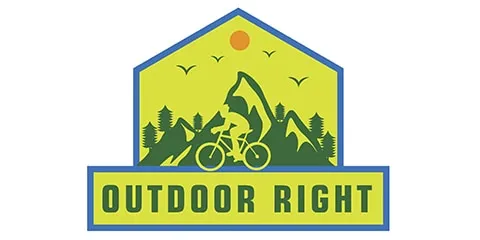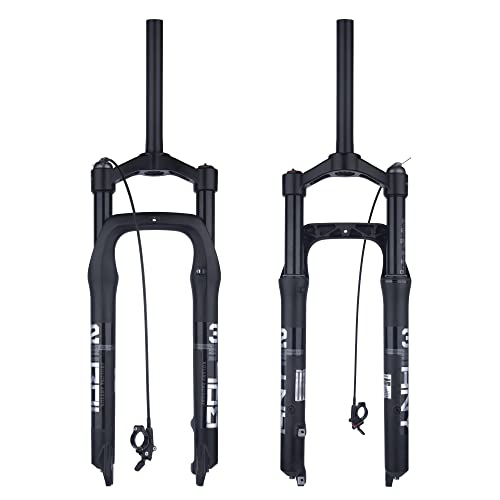If there is one thing that is hard to find for fat bike riders, it has to be a fat bike suspension fork.
Are you wondering why that is the case? Well, a good number of riders are just okay riding their fat bikes the way they are. So, they do not see the essence of investing in a suspension fork.
Besides, fat tires absorb significant shock, vibrations, and bumps, and for most riders, that is enough.
But does it mean that suspension forks are unnecessary for fat bikes? Of course not. If it were, then I wouldn’t have created this blog post.
Yes, not everyone indeed needs a suspension fork, especially when you have a full suspension fat bike. However, it’s also true that some fat bikes need the feature for the best cycling experience.
I know you have a lot of questions about the subject. So, I’m going to try to answer them as explicitly as possible.
Check out my top three recommended fat bike forks below.
Table of Contents
In a Rush? Here are Our Top Picks
What is a Suspension Fork on a Bike?
The suspension fork refers to the part holding the front wheel to the bicycle frame that contains hydraulic shock absorbers.
By absorbing shock and vibrations, a suspension fork offers you a more comfortable ride despite the riding surface’s bumpiness.
Do You Need a Suspension Fork on a Fat Bike?
Generally, you need a suspension fork if you ride off-road. That includes either of these surfaces:
Going through the bumps is never easier for a fat guy bike rider. So, you require a mechanism that can absorb it all. Simply put, you need a suspension fork.
A suspension fork absorbs shock and vibrations when riding off-road.
A suspension fork is also known to improve your bike control on rough terrains. With a fat tire bike with suspension, you get to navigate off-roads more seamlessly.
Who Doesn’t Need a Fat Bike Suspension Fork?
Generally, you don’t need a suspension fork if you plan to ride on smooth surfaces, mainly paved roads.
But why is that the case? In such a case, you can ride without having to worry about hitting anything that can result in vibrations or shock.
That’s unlike those who ride on rocky or rough terrains, who have to worry about massive impacts.
Of course, you also don’t need a suspension fork if you own a full suspension fat bike.
What are the Issues Associated with a Suspension Fork?
Even though a fork suspension promises a smoother ride, not every rider gets to experience that.
Some riders complain of hurt when taking on climbs and other challenging terrains. You may feel like the bike is choppy instead of enjoying a smoother ride.
Overall, this happens when you don’t have control of the bike.
The other common issue is that a fork suspension adds some weight to the bike. So, if the bike is already heavy, it will get heavier and interfere with your cycling experience.
How Else Can You Cope without a Fork Suspension?
You may ask: what if I don’t have fat bike front suspension and I have to ride off-road? Let me say beforehand that nothing replaces the right suspension fork.
Nevertheless, if you have to cope without it, consider these ideas:
- Wear riding gloves – They’ll give your hands enough cushioning against bumps. Also, they’ll provide you with enough grips to take on rugged terrains.
- Add bike handlebar grips – Though the default handlebar grip helps to some extent, you can absorb more shock by adding more bike handlebar grip. In general, this approach works when combined with the use of gloves.
- Change the bike stem – Though it’s not a cost-saving approach, this idea can help you absorb shock and vibrations. You’ll need to get a reliable stem replacement for the bike.
What Should You Look for in a Suspension Fork?
Consider the following:
- Bike Compatibility
You have to buy a fat tire suspension fork that’s compatible with your fat bike. If not, then you’ll be wasting money.
Most of them feature tapered steer tubes, measuring about 1.125 inches and 1.5 inches on the stem and crown, respectively. So, consider that.
The other consideration is the axel standard, responsible for quick-release. The feature should measure 9-20mm.
- Control
Most riders who find suspension forks choppy are those who don’t enjoy absolute control of their bikes. It’s mostly a case of buying the wrong fork suspension.
One key consideration is the compression damping feature, which absorbs impacts to give you more bike control.
The damping also helps you to control your bike at a high-speed to avoid the impact of a rough landing.
Additionally, it helps with the braking, and when you cycle at a slow speed.
Remember, adding a fork suspension to your bike means adding more weight. The secret is to go for an air-sprung fork and not a coil-sprung fork as the former is lighter.
But if you have no problem with the weight and would prefer an aggressive ride, then go for a coil-sprung fork. After all, they are made for all-around bikes.
More Considerations
- Suspension Travel
Every suspension fork for fat bike comes with a specified travel, the distance the suspension moves before its compression.
Some suspension forks are made for more extended travels than others. So, you need to pick the one that matches your fat bike.
For example, trail fat bikes require suspension forks with an 80-120mm suspension travel range, while fat mountain bikes require anything between 150mm and 170mm.
Generally, the further the suspension fork can travel, the more it can absorb shock and vibrations.
- Good Price
Remember, you are not buying a new fat bike. So, you shouldn’t spend all your money on this accessory. But still, it doesn’t mean that you should settle for the cheapest.
If you want to get the best shock and vibration absorption, be prepared to spend about $150 on average on a 20 inch fat bike suspension fork or greater.
Which Suspension Fork Should I Get for My Fat Bike?
Based on the buying considerations shared, here are the three best suspension forks for fat bikes:
1. Generic Bike Air Fat Fork – Best for Snow Fat Bikes
- Made of aluminum-alloy, no-corrosion.
- Air to adjust the fork’s hardness and softness.
- Travel 100MM, weight 2270g, black body color.
- Spread 135MM, fit 4.0" tire.
- For 26" MTB bike
The Generic Bike Air Fat Fork is the perfect choice for snow fat bikes with a 4-inch tire.
With it enjoying a 100m suspension travel, you can count on the suspension fork to absorb shock and vibrations over a reasonable range.
That also makes it perfect for trail fat mountain bikes.
The fork suspension is made from aluminum-alloy, which means it’s generally lightweight, rust-resistant, and durable.
It comes in a black body to blend well with most size 26-inch fat bikes.
The fork suspension has a 135mm spread, which means it’s compatible with a 135mm quick-release hub.
Additionally, the fork texture is adjustable with air.
Highlight Features
- Black aluminum-alloy body
- 100mm travel
- 26-inch size
- Air adjustment
- 135mm spread
2. BOLANY Snow Bike Front Fork – Alternative Pick for Snow Fat Bikes
- Spread 135MM, fit 4.0" tire.shoulder manual control + wire remote control two...
- Snow Bike Front Fork , Made of high quality Aluminum alloy,strong and durable,...
- Can be quickly disassembled and assembled,Oil and gas structure process....
- The outer tube of the fork tube is more stable and stronger, effectively...
- Exquisite workmanship, beautifully painted and has a bright appearance,...
The BOLANY SNOW BIKE FRONT FORK is another fantastic choice for snow-riding fat bikers. Like its counterpart above, this suspension fork suits 26-inch fat mountain bikes with 4-inch tires.
It also comes in an aluminum-alloy body to guarantee strength, rust-resistance, and lighter weight.
What’s more, it enjoys a 100mm suspension travel and a 135mm spread.
This fat bike front suspension fork promises stable bike control and protection when cycling outdoors.
It is easy to assemble and disassemble. Furthermore, it absorbs shock satisfactorily.
The fork suspension comes in an ergonomic design to suit long-distance cyclists.
Other than resisting rust, it also resists wear and dust pollution.
Highlight Features
- 26-inch size
- 100mm travel
- 135mm spread
- Easy assembly
- Ergonomic design
3. KRSEC Rebound Suspension Fork – Best for Beach Fat Bikes
If you are looking for a suspension fork to add to your beach fat bike, you can’t go wrong with the KRSEC REBOUND SUSPENSION FORK.
You can also fit this fork suspension on your snow fat bike.
The fast bike fork also suits 26-inch mountain bikes with 4-inch tires and has a 135mm hub-spacing (spread) like the bikes above it.
The difference is that it has a more extended travel range. It has a 120mm travel range.
It’s made from high-quality aluminum-alloy to guarantee a no-corrosion, lightweight fork.
Through its rebound adjustment function, you can adjust the compression damping to a comfortable air pressure level.
Highlight Features
- 26-inch size
- Aluminum body
- Rebound adjustment
- 135mm spread
- 120mm travel
The Wrap – Should You or Should You Not Get a Fat Bike Fork?
After looking at the pros and cons of using a suspension fork, here are the takeaways:
- You should get a fat bike suspension fork if you ride off-road. That includes riding on bumpy, root-prone, and stone-hit surfaces.
- You don’t need a suspension fork if you ride on smooth terrain.

Alex Mwangi is the creator of Outdoor Right and an outdoor enthusiast. During his free time he enjoys riding his road bike or traveling the world looking for his next adventure.




